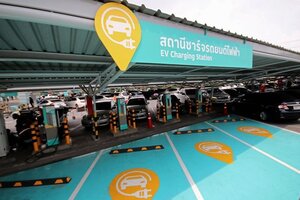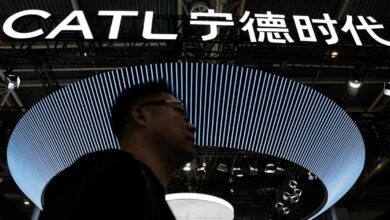KIEP Report Says Korea Needs to Deal with China’s Penetration of EV Market in Southeast Asia

Recently, China’s share of the electric vehicle market in Southeast Asia, including Thailand and Indonesia, has been growing rapidly.
Chinese companies ranked first or second in Southeast Asian countries in terms of sales volume in 2023, according to a report titled “Factors and Implications of Chinese Electric Vehicles’ Preoccupation of the Southeast Asian Market,” published by the Korea Institute for International Economic Policy (KIEP) on May 8. Specifically, they ranked first in Thailand (76 percent), Malaysia (44 percent), Singapore (34 percent), and Indonesia (42 percent).
In Thailand, the largest EV market in Southeast Asia, Chinese companies held the first through fourth positions in terms of sales volume in 2023. That is a large share considering Tesla’s share was about 7.7 percent, ranking fifth.
Chinese companies have penetrated the Southeast Asian market while electrification has been delayed among Japanese automakers. Previously, Japanese automakers dominated the Southeast Asian market with a market share of about 90 percent but they lost ground to Chinese automakers as they were not fast enough.
At the time, countries such as Thailand and Indonesia were actively promoting EVs and internalizing supply chains. In the process, their cooperation with Chinese EV companies was strengthened. This was in line with China’s policy to promote EVs in Southeast Asia, which was in the early stages of EV adoption. In fact, Chinese companies quickly captured early EV markets in those countries by partnering with major local dealers and organizations.
In addition, Chinese companies continued making efforts to secure price competitiveness. They are accelerating their entry into new markets by vertically integrating, innovating process technologies, localizing supply chains, and reducing logistics costs.
Chinese automaker BYD has vertically integrated its entire supply chain from core raw materials and batteries to semiconductors, electronics, lighting parts, car sales, and financial services for those who want to buy cars. It has integrated key components such as powertrains and batteries, shortened processes, and lowered materials and production costs.
Another Chinese automaker, Wuling, has set up a production base in Indonesia with Chinese suppliers. It succeeded in cutting costs by building more than 40 percent of supply chains for its factories in Indonesia.
Experts expect the EV market to expand in Southeast Asia after Europe and the United States. By 2035, the largest markets will be Indonesia (4.5 million units), Thailand (2.5 million units), Vietnam (1 million units), and the Philippines (750,000 units), according to their forecasts. In terms of sales value, Thailand (US$35 billion to US$42 billion) may outweigh Indonesia (US$26 billion to US$30 billion).
Hyundai and Kia established subsidiaries in Thailand in 2023. Major Japanese companies such as Toyota, Honda, Mitsubishi, and Isuzu are also expanding their presences in Thailand. The four companies are expected to invest US$4.3 billion in Thailand over the next five years. Toyota and Isuzu announced that they will launch electric pickup trucks in Thailand next year. The formation of a huge electric vehicle market in Southeast Asia is expected to fuel competition among Korea, China and Japan.
In response, proposals have been made to lower tariff barriers to increase the competitiveness of Korean companies. When Korean companies export electric vehicles to Thailand, they are subject to a 40 percent tariff under the ASEAN-Korea Free Trade Agreement (FTA), which is disadvantageous for Korean companies in terms of price competitiveness.
“China exports electric vehicles to Thailand duty-free under the China-ASEAN FTA and exports electric vehicle parts duty-free under the Regional Comprehensive Economic Partnership (RCEP),” said Choi Jae-hee, a researcher at the KIEP. “The Korean government needs to improve related items through further negotiations.”
“It has become important that countries around the world, including major economies in Southeast Asia, invest in localized production of EVs to the extent that they promote the internalization of supply chains for EVs,” he said. “One idea is to consider expanding financial supports to include those from policy financial institutions and establishing a separate special purpose fund to foster key national industries.”



